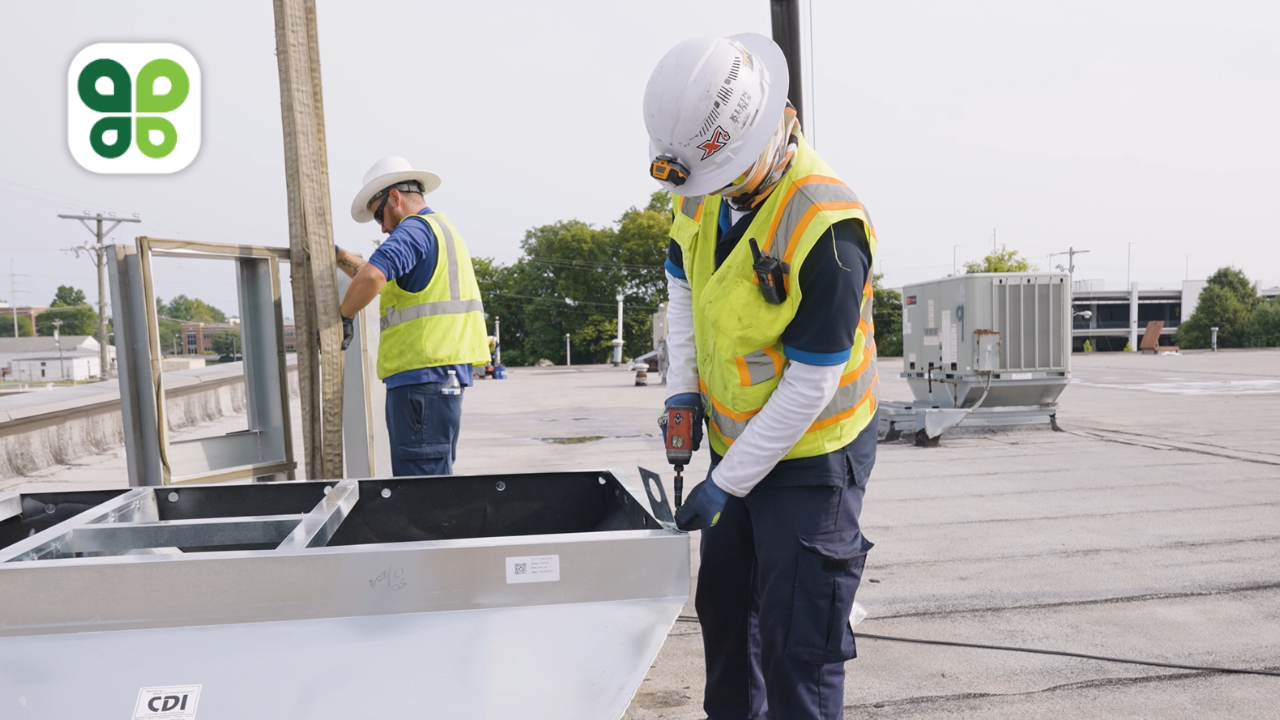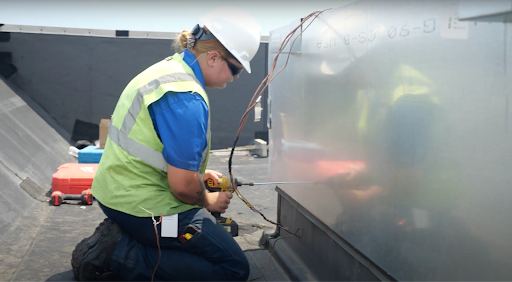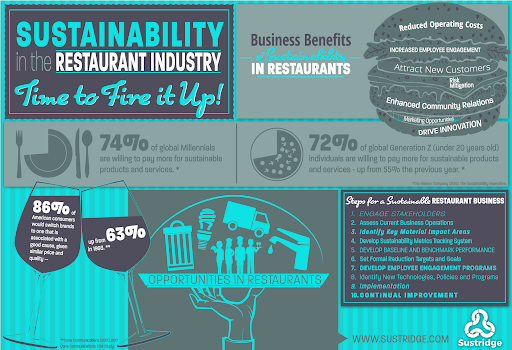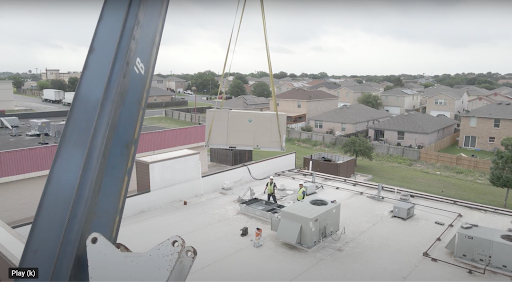
How to Take Care of Restaurant HVAC Repairs
Restaurants create a ton of heat and humidity, from cooking, dishwashers, and even appliances like refrigerators. One of the jobs of heating, ventilation, and air conditioning (HVAC) is to maintain a safe and healthy atmosphere, so if your restaurant’s temperature or humidity seems off, there could be an issue with your HVAC unit. Restaurant HVAC systems are vital, and unexpected issues can cause big problems for any business. The best way to avoid HVAC issues to to make sure you have a proper maintenance plan in place.
This article will examine the most common restaurant HVAC problems and how to prevent and address them. We’ll also highlight when your restaurant’s HVAC system is beyond repair and how you can replace it.
4 Common Reasons You May Need a Restaurant HVAC Repair
1. Poor Ventilation
Why it Matters
Food safety codes require a proper kitchen ventilation system, and for good reason. Ventilation ensures that hot air from your kitchen doesn’t go to your dining room. This keeps patrons more comfortable, which could increase customer retention. Proper ventilation also helps to keep dining room odors at bay, for a more pleasant atmosphere.
Indoor air quality isn’t important to just the comfort and atmosphere of a restaurant; it’s also critical to the safety of both customers and employees. Without adequate ventilation, smoke, exhaust, and gas fumes will accumulate, jeopardizing employee and customer health.
What to Do
If your kitchen ventilation system malfunctions, you can open the windows as a temporary solution if the weather permits it. Natural, clean air will disperse dangerous gas fumes and noxious odors.
During cold winter months, you could try a makeup air unit to pull fresh air into your building. Additional fans can also do the trick.
However, it is important to note that these are temporary solutions. Opening windows will bring in unfiltered air into your restaurant that is likely dirty and not suitable for hygiene and food safety. A more long-term solution will be necessary, so you will need to contact an HVAC professional ASAP to repair a broken commercial ventilation system.
2. Blown Fuses
Why it Matters
Blown fuses and tripped breakers can occur with any type of electrical appliance, including commercial HVAC systems. As many of these units rely on electricity to function, overworking them can cause a tripped breaker on your electrical board.
If this happens frequently, it’s a sign that you’re using too much energy. Fuses don’t blow if they’re not overheated. Consistent overheating means you’re using more energy than your circuits can handle.
This drastically increases your carbon footprint and increases your risk of electrical fires. Therefore, it's important to be mindful of your HVAC system's energy usage and to follow proper maintenance practices to avoid such issues.

What to Do
A clogged duct or air filter is the most likely cause of an overworked unit that trips your breaker. Check for any blockages if you suspect your HVAC system blew a fuse. Clear that blockage to the best of your ability.
Additionally, look into decreasing your overall electricity usage. Wasting electricity by leaving lights on and refrigerator doors open only adds to the energy consumption of your building, ultimately resulting in a tripped breaker. Consider an energy monitoring system to track your usage.
3. Thermostat Malfunction
Why it Matters
Heating and cooling issues aren’t always from the HVAC unit itself. If your programmable thermostat is off, your system won’t maintain the right temperature. This is vital with an HVAC/R (heating, ventilation, air conditioning, and refrigeration) unit.
Inadequate refrigeration causes food waste and spoilage. Spoiled food is unsafe for consumption and must be thrown out. Food waste is also bad news for your bottom line, as you can’t make the money you spent on those ingredients back on food sales.
Spoiled food also negatively impacts the environment, as decomposing food waste in landfills creates a lot of carbon emissions. According to the EPA, the carbon emissions from food waste in the United States are the equivalent of 42 coal-fired power plants.
 Source: Sustridge Sustainability Consulting
Source: Sustridge Sustainability Consulting
What to Do
Before you call an HVAC/R & restaurant repair contractor, check to see if your commercial refrigeration unit is the problem. Double-check your thermostat and defrost control board to rule them out as the root cause.
Try recalibrating your thermostat or calling a technician who can. If your thermostat is beyond repair, upgrade to a smart thermostat. Smart thermostats maximize energy efficiency by automatically adjusting to your building’s current temperature and humidity.
4. Dirt, Dust, and Debris
Why it Matters
An appliance being unclean and being broken isn’t the same thing, but one can lead to the other. Grime or ice build-up on your exhaust fans weighs their blades down, forces them to work harder, and increases the chances that they’ll break.
Unclean units rust faster, which decreases the system’s lifespan. Rusty ducts are more prone to dangerous and energy-wasting leaks. Clogged air ducts may also put your unit into overdrive and cause a breakdown.
There is a correlation between uncleanliness and breakdowns in equipment, where uncleanliness can lead to equipment failure and equipment failure can cause uncleanliness. For example, poor air circulation can contribute to increased mold growth. Good circulation also prevents the spread of airborne pathogens among staff and customers.
What to Do
To avoid unsightly HVAC units and potential mold growth and material breakdown, it's crucial to establish a regular cleaning schedule. Waiting until the unit looks dirty may indicate that damage has already occurred, making it important to prioritize preventative maintenance.
Set daily, weekly, and monthly tasks to maintain food sanitation and decrease the need for HVAC repairs. You should also change your air filters every three months. Train your staff to keep up with these tasks.
Never Underestimate the Power of Preventative Maintenance
Repair and maintenance go hand-in-hand. Proper maintenance decreases your need for repairs and lessens the severity of any needed repairs in the future. Your equipment needs a regular maintenance schedule to work properly, including your HVAC.
Better maintenance means fewer repairs, less energy wasted, and more cost savings. There’s usually a fee for a regular maintenance contract, but it will save you a lot in the long run.

What to Do When Servicing Your Restaurant HVAC Isn’t Enough
Even the best-cared-for HVAC units only last approximately 15 to 20 years. Old units with weak airflows, strange odors, grinding noises, and frequent breakdowns are probably reaching the end of their lifespans. Once they hit this point, it’s more cost-effective to replace the entire system.
Energy-efficient HVAC systems last significantly longer than their non-efficient counterparts. When it’s time to make the switch, choose a high energy-efficient model that reduces utility costs and mechanical wear.
Budderfly offers HVAC upgrades at no upfront cost. Get all the advantages of an energy-efficient system without the expensive initial purchase. Contact us today for your complimentary energy assessment and HVAC service upgrade.

